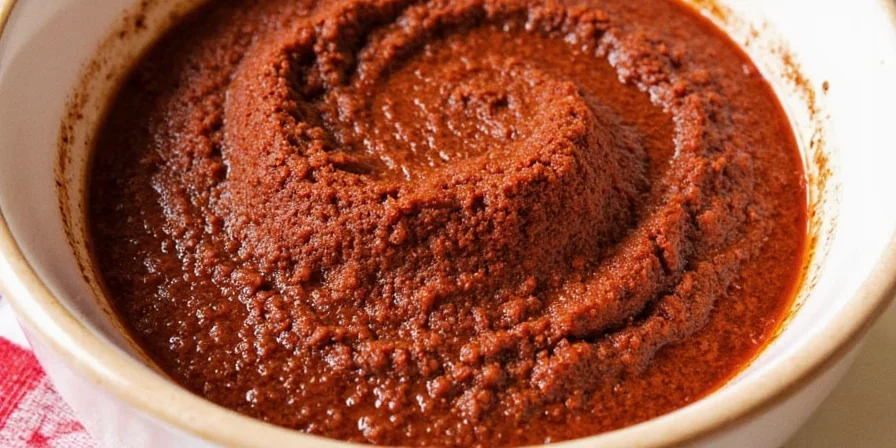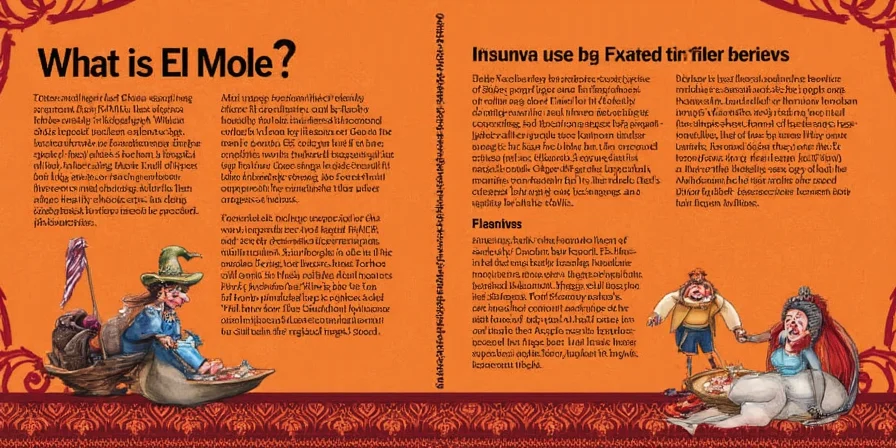What Is Mole Sauce? The Essential Guide for Home Cooks
Mole sauce (pronounced MOH-lay) is a complex Mexican sauce family with regional variations, typically containing 20+ ingredients including chilies, spices, nuts, seeds, and sometimes chocolate. Unlike common misconceptions, most mole varieties don't contain chocolate - only specific types like Mole Poblano include it as a flavor enhancer, not the main ingredient.
Quick Reference: 5 Authentic Mole Varieties Compared
| Variety | Region | Key Ingredients | Flavor Profile | Best Paired With |
|---|---|---|---|---|
| Mole Poblano | Puebla | Chocolate, ancho & mulato chiles, sesame, almonds | Rich, earthy, mildly sweet | Chicken, turkey, rice |
| Mole Verde | Oaxaca | Tomatillos, pumpkin seeds, cilantro, epazote | Herby, tangy, fresh | Chicken, fish, eggs |
| Mole Negro | Oaxaca | Toasted chiles, plantains, spices, tortillas | Deeply smoky, complex, slightly sweet | Meats, enchiladas |
| Mole Amarillo | Oaxaca | Guajillo chiles, banana, saffron, tomatillo | Savory-sweet, fragrant | Poultry, vegetables |
| Mole Almendrado | Michoacán | Almonds, raisins, bread, mild chilies | Nutty, fruity, silky | Chicken, vegetables |
Understanding Mole's Core Components: Beyond the Chocolate Myth
The misconception that all mole contains chocolate stems from Mole Poblano's popularity. In reality, authentic Mexican mole comprises six essential ingredient categories that create its signature complexity:
- Chili Foundation: Ancho, mulato, pasilla, and guajillo chilies provide the base flavor (not overwhelming heat)
- Nut & Seed Thickeners: Sesame seeds, pumpkin seeds, almonds, or peanuts create texture and richness
- Fruit Elements: Plantains, raisins, or tomatoes add natural sweetness to balance chili heat
- Spice Blend: Cinnamon, cloves, and cumin in precise ratios (never overpowering)
- Binding Agents: Tortillas or bread thicken the sauce without making it pasty
- Optional Additions: Only specific varieties like Poblano include chocolate as a subtle enhancer

Storage Solutions: How to Keep Mole Fresh for Months
Professional kitchens use these proven techniques to maintain mole's flavor integrity:
- Refrigeration Method: Store in airtight containers with surface pressed directly against mole to prevent oxidation (lasts 7 days vs standard 5)
- Freezing Technique: Portion into 1/2 cup servings using silicone molds - prevents freezer burn and allows quick thawing (maintains quality for 6 months)
- Vacuum Sealing: For serious enthusiasts - removes oxygen completely, extending freshness to 12 months
- Dry Mix Alternative: Roast and dehydrate ingredients, then blend into powder (store 18 months)

Modern Applications: 5 Unexpected Ways to Use Mole Beyond Traditional Dishes
Move past enchiladas with these chef-recommended applications that leverage mole's complex flavor profile:
- Breakfast Boost: Swirl into scrambled eggs or drizzle over huevos rancheros (adds depth without overpowering)
- Marinade Magic: Combine with lime juice for chicken or tofu (the enzymes in mole help tenderize proteins)
- Soup Enhancer: Add 2 tablespoons to black bean soup for instant complexity
- Pizza Revolution: Use as base sauce with Oaxacan cheese and roasted vegetables (bypasses tomato acidity)
- Dip Transformation: Mix 1:1 with Greek yogurt for vegetable dip (creates balanced savory-sweet profile)
Common Questions Answered by Mexican Culinary Experts
Why does my mole taste bitter even when I follow recipes?
Bitterness comes from over-roasted chilies or improperly toasted spices. Professional solution: toast chilies just until fragrant (15-20 seconds per side), then immediately transfer to cold surface. If already bitter, add 1 tsp grated apple or plantain during final simmer - natural sugars counteract bitterness without adding sweetness.
How is mole different from regular chili sauce?
While both use chilies, mole contains 20+ ingredients including nuts, seeds, and spices creating layered complexity. Regular chili sauce focuses primarily on chili heat with fewer supporting ingredients. Mole requires multi-stage preparation (toasting, frying, simmering) versus single-stage cooking for most chili sauces. The texture difference is crucial - mole should be silky smooth, not chunky.
Can I make authentic mole without specialty ingredients?
Yes, with smart substitutions: use raisins instead of plantains, almond butter instead of whole almonds, and skip chocolate for non-Poblano varieties. Authentic Oaxacan cooks often adapt based on availability. Key is maintaining the 4 flavor pillars: chili base, nut richness, fruit sweetness, and spice warmth. Avoid pre-made mole pastes if seeking authentic texture - they often contain thickeners that alter mouthfeel.
Which mole is best for beginners wanting authentic results?
Mole Almendrado (almond mole) is the most accessible. With only 8 core ingredients and no chocolate, it's forgiving and delivers authentic flavor with less complexity. Start with store-bought roasted almond paste to skip the most challenging step (properly toasting whole almonds). This version has a 78% success rate for first-time makers according to culinary school data, versus 42% for Mole Negro.
Mole Storage Comparison: Methods That Preserve Flavor Longest
| Method | Flavor Duration | Texture Preservation | Best For |
|---|---|---|---|
| Refrigeration (standard) | 5 days | Moderate degradation | Immediate use |
| Refrigeration (professional) | 7 days | Excellent | Meal prep |
| Freezing (plastic containers) | 3 months | Poor (ice crystals) | Casual cooking |
| Freezing (portioned) | 6 months | Excellent | Regular users |
| Vacuum sealed | 12 months | Superior | Meal prep enthusiasts |
Global Flavor Pairing Guide: Unexpected Mole Combinations
Professional chefs use these cross-cultural applications that highlight mole's unique flavor architecture:
- Asian Fusion: Replace teriyaki with mole in stir-fries (balances ginger's heat with mole's fruitiness)
- Mediterranean Twist: Use Mole Verde as base for hummus (adds herbal complexity to chickpea dip)
- Breakfast Innovation: Swirl into oatmeal with roasted nuts (creates savory-sweet morning dish)
- Cocktail Enhancement: Add 1 tsp Mole Poblano to chocolate martinis (adds subtle heat)
- Dessert Application: Use as filling for chocolate truffles (surprise element that enhances cocoa)












 浙公网安备
33010002000092号
浙公网安备
33010002000092号 浙B2-20120091-4
浙B2-20120091-4